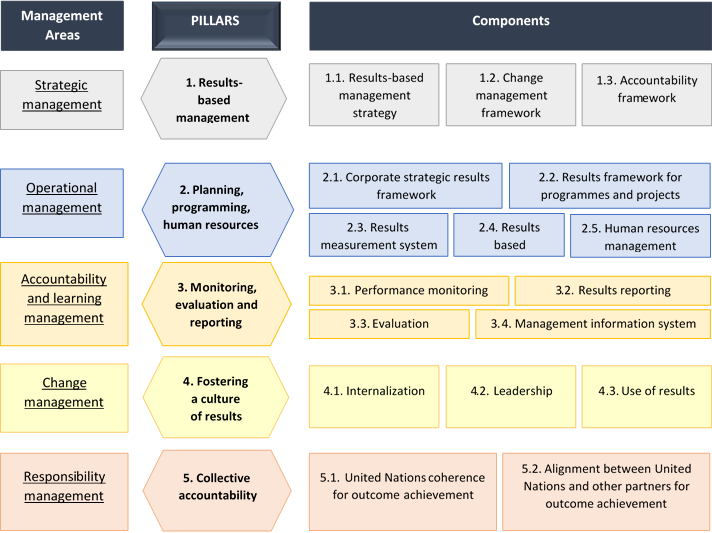- English
- Français
- Español
- 中文
- Русский
- عربي
RBM in the United Nations system: High Impact Model for RBM: benchmarking framework, stages of development and outcomes (JIU/NOTE/2017/1)
The model was developed with the intensive involvement of over 25 UN system organizations. It responds to demand from organizations for a common basis for conceptualizing and for collaboration and sharing knowledge about RBM. The model is aligned with the QCPR outcome areas. It provides a basis for self- or peer assessment of stage of development and outcomes of RBM. The assessment methodology allows for a valid assessment across organizations. It was thus used in the JIU study outlined next.
The analysis is focused on 12 UN system organizations. It finds that RBM is highly relevant in the context of 2030 Agenda as the results principles are aligned with the imperatives for the success of the 2030 Agenda. Organizations have made substantial progress since the implementation of RBM started in 2002. Progress has not however been accompanied by a commensurate level of success in making a difference in the use of results information, in changes in the results culture and human resource management, in system-wide operations with conjoint outcomes across UN system organizations, in collective action and partnerships with effect on collective accountability.
The advancement of RBM lies in addressing conceptual, structural, systemic, and political constraints. Success and added value would be enhanced when major conceptual, political, structural, systemic and governance issues analysed in the study are addressed at a system-wide level. The study makes recommendations for the continued implementation of results-based management as an outcome directed adaptive management strategy responding to fast pace of change and complexity in development, and to the imperatives of the 2030 Agenda.
Recommendations address organizational leadership and member states to shift paradigms and to balance accountability with a systematic and intentional focus on learning and adaptation based on what works, why and how; leadership that is strategic and is both responsive and responsible in managing for achieving results; a culture of results that goes beyond structures, processes, and systems to address changes in staff values and mind-set important for transformative change; an incentive system for achieving results that addresses staff accountability for results as well as accountability for transformative learning, innovation, measured risk taking, and collaboration; addressing the conjoint nature of outcomes via development of system-wide strategic framework(s) to support planning, implementation, and evaluation systems that are aligned with improvement sciences respecting the fast pace of change and challenges in development; the conceptualization and development of new models of collective accountability for collective impact. Such system-wide and collective operations require shifts in existing governance structure. The sustainability of results-based management relies on partnerships, and on the development of national systems and capacities for results-based management, evaluation and statistics. These are all important consideration for both RBM and the 2030 Agenda.


